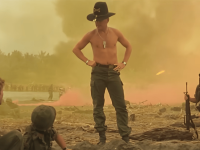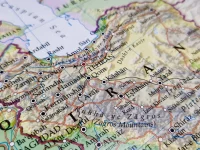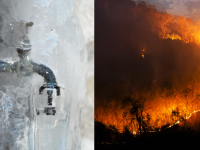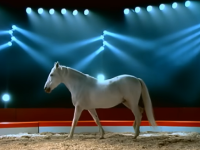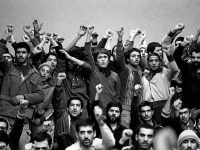Movie. Frost from Lithuanian Sharunas Bartas. There really isn’t all that much to recommend

BLACK MOVIE. Lithuanian auteur Sharunas Bartas tackles the armed conflict in Ukraine in his latest film, which co-stars Vanessa Paradis and premiered in the Directors' Fortnight.
A young Lithuanian couple’s idea of a road trip is to drive from the Baltics to the war-torn Donbass region, in eastern Ukraine, in Frost, the latest feature from Lithuanian auteur Sharunas Bartas (Few of Us, Seven Invisible Men). Shot on the road and on location over a period of three months, this dire drama gets full marks for authenticity, with a scene in which two (actual) Ukrainian soldiers explain to the protagonists why they are fighting the war they are waging a certain highlight. But beyond this sequence, there really isn’t all that much to recommend, with the lead characters never fleshed out and the narrative about as aimless as the GPS-less protagonists. The auteur’s name and the incongruous presence of Vanessa Paradis as a glamorous journalist in a supporting role could entice some festivals to add this pic to their rosters after its Directors’ Fortnight premiere, but beyond the festival circuit, it will face an uphill battle.
Twentysomething Rokas (Mantas Janciauskas) is talked into driving a van filled with humanitarian aid to the Ukraine by someone who can’t leave the country. They meet outdoors, at night and not exactly in summer, and from the start there’s something a little odd and unwelcome about both their encounter — Couldn’t they meet in a bar? Who is this other guy, anyway? — and the discussed cargo, which seems to consist of footwear and food and barely fills just one van. Money is never even discussed but Rokas — blond hair, blank stare — seems to be a decent guy, so maybe the humanitarian motive is enough of a reason to say yes. The Good Samaritan does ask his girlfriend, Inga (Lyja Maknaviciute), to accompany him one supposes because there aren’t that many films about road trips people took on their own.
Their first stop is Poland, where they meet their local contact, Andrei (Polish star Andrzej Chyra of United States of Love), whose behavior is also somewhat strange and who tells them he’ll meet them in a couple of days at a posh hotel. Once there, they hang out with some ex-pats, some of which are journalists and one of whom looks like Paradis. First at a reception and then in room where they raid the mini bar, this motley crew discusses the war and journalism in the fake-profound way favored by both drunks and badly written movies.
Both Inga and Rokas end up pairing off with someone else at the end of that drunken night, which leads to some bickering in the van the next day. Audiences might be excused for cheering on this development, as perhaps the characters will finally reveal a little bit about themselves, but instead everything is resolved in about five seconds and the duo return to staring out the window again. So much for instilling the material with some conflict.
Perhaps it is because of this lack of conflict in his own comfortable, European Union cocoon that especially Rokas seems morbidly fascinated by the armed conflict in the Donbass region, which pro-Russian separatists proclaimed independent from Ukraine in 2014 and where fighting between Ukrainian forces and the Russia-backed separatists continues. When the organization where they were supposed to deliver their goods seems to have moved to an unknown address, Rokas and Inga wander ever closer to the frontlines for no apparent reason — or at least no articulated one — other than Rokas’ curiosity, perhaps spurred on by the fact he speaks Russian, which his clueless girlfriend doesn’t.
What exactly Bartas is trying to do here is hard to fathom. He’s made gorgeous movies wholly without dialogue, such as Few of Us, and others, such as his recent Peace to Us in Our Dreams, that combine images and dialogues to entrancing if not always immediately accessible effect. In fact, Bartas’ films became famous because of his capacity for conjuring images that help tell his stories, with the director having worked as his own cinematographer on quite a few of his titles, often opting for mesmerizing long takes in which the viewers could lose themselves. Here, DP Eitvydas Doskus seems to have been instructed to make the visuals as unremarkable as possible, with dialogue frequently done in the most basic shot/reverse-shot manner and scenes often short and drab, without any poetry (even the film’s last, supposedly transcendent image feels mechanical).
The workmanlike cutting of actress-turned-editor Dounia Sichov further reinforces the pedestrian-feeling quality of the material, as if the director and his cast and crew went into the film without any idea or preparation in terms of what and how to shoot what they’d find on the road. And the pic seems unsure what to do with Paradis’ character, who is seen buying cigarettes alone at one point, suggesting the film might follow two separate stories, but then she’s never seen again after the leads and herself meet at the hotel for that one night. Similarly, the character of Andrei feels ill-conceived and unfocused. What exactly his role is in the story of Rokas and Inga is unclear, and God knows these two insipid leads need colorful supporting characters to bounce off of. If it weren’t for that extended moment of truth from the two soldiers, Frost would make for frosty viewing indeed.
Il est à l’image de son cinéma. Taciturne, voire taiseux, mystérieux et radical. Lorsqu’il est venu la semaine passée présenter son dernier film au festival Black Movie, Sharunas Bartas a dans la foulée accepté d’accorder quelques interviews. Et même si on sent que l’exercice lui pèse et qu’il n’est pas vraiment à l’aise, le cinéaste lituanien s’y prête sans broncher. Genève n’est pas pour lui une ville tout à fait inconnue. Il y avait même présenté son premier film, Trois jours, en 1991, dans le cadre du Festival Stars de demain. Il était alors venu avec la comédienne Katerina Golubeva, qui fut son épouse et mit fin à ses jours en 2011. «J’y suis repassé en transit ensuite», précise-t-il.
Mais depuis, Bartas a fait son chemin dans un cinéma d’auteur exigeant, signant des films sélectionnés dans les grands festivals mais généralement écartés des circuits commerciaux. Certains se souviennent peut-être de titres comme Few of Us(1996) ou The House (1997), de leurs plans fixes sidérants et du travail d’épure du cinéaste sur les silences et l’espace. En mai 2017, c’est à la Quinzaine des Réalisateurs, à Cannes, qu’il a présenté Frost. Un film étonnant, ne serait-ce que par la présence d’une star dans son casting, Vanessa Paradis.
Les stars sont abordables
«Nous cherchions des comédiens en France et ailleurs, murmure-t-il. Son nom m’a été suggéré et elle était disponible aux dates du tournage. Je ne sais pas comment elle a réagi en lisant le scénario, mais je suppose que ce fut une bonne réaction, puisqu’elle a accepté. Sans condition. Avant de commencer le film, nous avons parlé. Nous avions un langage commun. Enfin, nous l’avons trouvé. On croit souvent que les stars sont inaccessibles, ou dans leur tour d’ivoire. C’est faux. Elles sont souvent plus abordables qu’on ne le pense. Ce qui est parfois compliqué, c’est le timing. Mais une fois que ce problème est résolu, les choses se passent généralement très bien.»
Vanessa Paradis chez Sharunas Bartas. L’équation avait de quoi surprendre. Certes, elle n’y a pas le rôle principal. Les héros de cette histoire, ce sont un homme et une femme, un jeune couple qui part de Vilnius pour apporter des vivres et des vêtements à des partisans ukrainiens qui font la guerre aux Russes. Froid et dénuement ponctuent un voyage rigoureux, glacial, parfois nocturne, dans un pays où terre et ciel semblent se confondre. C’est dans un hôtel polonais où ils font escale qu’ils rencontrent des humanitaires et des journalistes. Parmi ces derniers, Vanessa Paradis. Étonnante apparition comme surgie du néant, improbable contrepoids à ces deux antihéros que le film semble couver du regard.
«Nous avons tourné la fin du film au début, admet le cinéaste, relativement évasif. Tout était très écrit et c’est une chose qui facilite le tournage. Qui pourtant n’a pas été très simple. Il y avait une trentaine de personnes, chacun à un poste bien déterminé. Je leur donnais des ordres sans être dur. Être dur ne sert à rien. Pour le reste, Frost est tourné comme un film d’action. Et pourtant, c’est un film sur l’amour. Et non pas un film d’amour.»
Dans ses indications, Bartas cherche aussi à ce que ses acteurs soient dans un état proche de leurs personnages. «Ils doivent réagir comme réagiraient ceux qu’ils incarnent. Je ne leur parle pas beaucoup. Et je ne pense pas qu’il soit besoin de tout expliquer dans le détail. Je privilégie une direction d’acteurs très simple. En supposant qu’ils connaissent mon cinéma et peut-être ma manière de tourner.»
Secrets d’écriture
Sharunas Bartas tourne des films depuis presque trente ans. Et s’il est largement reconnu par les cinéphiles, il reste pratiquement inconnu des autres franges du public. Un état de faits qui ne lui pèse absolument pas. «Lorsque je fais un film, je ne pense à rien. Ni à son impact, ni à son futur public, ni même aux festivals qui éventuellement le sélectionneront. Il n’y a ni calcul ni ambition. Je le réalise, c’est tout. Ensuite, s’il y a de l’intérêt, c’est parfaitement positif. Sinon, je ne peux pas dire que je sois heureux avec mes films. Je pense qu’on peut toujours faire mieux. Quant à leur réception, je ne peux pas les influencer. Chacun a le droit ou non de les accepter. Avant, il y a l’écriture, qui ne prend que quelques mois et qui n’est pas du tout une étape facile. J’ai besoin d’énormément de concentration pour écrire.»
Si ses secrets d’écriture resteront bien gardés, Sharunas Bartas se défend par ailleurs d’être un cinéphile. «Je visionne des choses en fonction de mon humeur. J’aime des films absolument différents. J’ai un faible pour les auteurs et il m’arrive de revoir mes vieux films.»
Récemment accusé d’agression sexuelle par une comédienne, Sharunas Bartas n’évoquera évidemment pas l’affaire. À la fin de l’interview, il tient pourtant à faire un selfie de notre rencontre. Décidément, quel singulier personnage!
Pascal Gavillet
Production companies: Studija Kinema, KinoElektron, Insight Media/Tato Film, Donten & Lacroix Films, KNM, Reborn Production
Cast: Mantas Janciauskas, Lyja Maknaviciute, Andrzej Chyra, Vanessa Paradis
Director: Sharunas Bartas
Screenplay: Sharunas Bartas, Anna Cohen Yanay
Producers: Sharunas Bartas, Jurga Dikciuviene, Janja Kralj, Olena Yershova, Volodymyr Filippov, Maria Blicharska, Monika Sajko-Gradowska, Michel Merkt
Director of photography: Eitvydas Doskus
Production designer: Oleg Dorychenko
Editor: Dounia Sichov
Music: Pawel Mykietyn
Casting: Jurga Dikciuviene, Constance Demontoy
Venue: Cannes Film Festival (Directors' Fortnight)
Sales: Luxbox
In Lithuanian, Russian, Polish, English, Ukrainian
130 minutes



